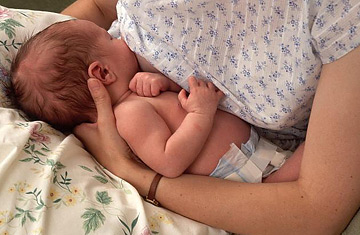
The benefits of breast-feeding are many and varied. Studies suggest that breast-fed kids are smarter, taller, thinner, healthier and less stressed than babies on bottles. Plus, breast-feeding helps moms bond with their babies and may even lower their blood pressure. So, is there anything breast milk can't do? Apparently, yes, according to a new study published Tuesday by BMJ Online: It doesn't offer infants much defense against asthma or allergies.
That's a question researchers have long debated. Until now, the evidence has been mixed: Some studies have suggested that exclusive, prolonged breast-feeding helps stave off asthma and allergies later in life; other studies have shown no protection, or even an increased risk. But most of the available data has come from observational studies. The new BMJ paper, in contrast, was a large, long-term randomized trial that involved more than 17,000 breast-feeding women and babies, 13,889 of whom were tracked until age 6 1/2. Researchers recruited the moms in maternity hospitals and clinics in Belarus. About half of them — those who had already begun breast-feeding — were encouraged to continue breast-feeding exclusively; the control group got no such extra urging.
Researchers report that women in the intervention group breast-fed significantly longer than women in the control group: at three months, 73% of the intervention group was breast-feeding, compared with 60% of the control group, and the number of women breast-feeding exclusively was seven times higher. By a year after birth, rates of breast-feeding had dropped across the board; but still, 20% of the intervention group was breast-feeding versus 11% of the controls.
When the infants were about 6 1/2 years old, researchers followed up with standard questionnaires about asthma, hay fever and eczema. Rates of each condition were similar in both groups. In general, about 10% of the children had ever suffered wheezing in their lives, though less than 1.5% had had full-blown asthma. Roughly 3% to 5% had had hay fever, and about 1% had suffered bouts of eczema. Researchers also performed skin-prick tests on the children; again, there was no significant difference between incidence of allergy — to dust mites, cats, pollen, grass and Alternaria, a common fungus — between the groups. In the breast-fed group, about 9% were allergic to pollen and Alternaria, 12% to cats and grass and 15% to dust mites. Absolute rates of all allergies were slightly lower in the control group, but the variations weren't statistically relevant.
The BMJ study is "to our knowledge.. the largest randomized trial ever done in the area of human lactation," write the study's authors. But it's not likely to be the last. Science will continue to debate the discrete pros and cons of breast-feeding, but doctors unanimously agree that breast, in general, is best for babies' health, growth and development. Mothers should breast-feed newborns for at least 12 months — and exclusively for at least 6 months — according to American Academy of Pediatrics guidelines.
